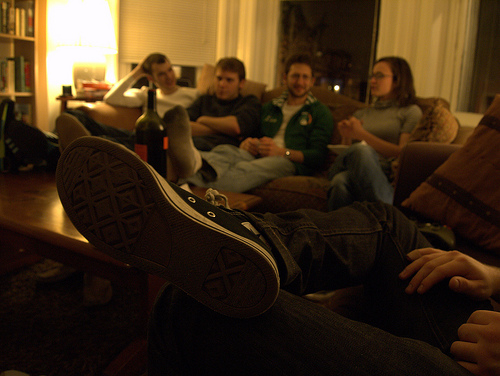
My house is moldy and Parkinson’s Law is mostly responsible. If you’re not familiar, the Law is usually spelled out like this: “The time required for a task expands to fill the time available for its completion.” It works for money too.
So when you’ve settled into a schedule filled with recurring tasks, they each have a tendency to expand until they press up against the next one, and then they don’t move around very easily. Without much variation (a day job does this quickly) the parts get dusty, then mold grows between them, and you begin to forget that they can move at all. Instead of a series of independent tasks, a routine can come to look to the mind like it’s one solid, familiar ring, seven days in circumference, studded with the odd unexpected task or birthday party.
I’m doing some house cleaning and I still have some mold problems, so I’m giving a large part of a routine a quarter-turn by dialing my regular article forward to Mondays for a while. I’ll see where the other bits reassemble around that. It’s like defragging my schedule, for you computer geeks. Call it a mini-experiment.
Certain important things (namely reading books and meditating — probably the two most wholesome things I do) have been flung out of the ring due to substantial G-forces, and there are no obvious gaps for them to jump back in safely.
I’m aware it’s more of an internal adjustment that isn’t really meant to interest you, but I thought I’d say something today because I don’t like to be a mysterious no-show. You might also want to try this kind of defrag in your own routine and see how it settles out.
And while I have you here for a moment, there are a few interviews I’ve done with other bloggers that I never had a good chance to share.
Sui from Cynosure asked me about self-love and hard times.
Nicki from The Veggie Tales talked to me about food.
And (quite a while ago) my friend Srinivas from BlogcastFM interviewed me about blogging in this podcast.
Anyway, see you Monday.
-D.
***
Photo by Monster Pete









 I'm David, and Raptitude is a blog about getting better at being human -- things we can do to improve our lives today.
I'm David, and Raptitude is a blog about getting better at being human -- things we can do to improve our lives today.
عکس پرینت در سال ۱۳۷۶ ابتدا با نام خانه چاپ و طرح ایران فعالیت خود را آغاز کرد و در سال ۱۳۹۵ با تغییر نام به عکس پرینت فعالیت رسمی خود را در حوزه چاپ عکس به صورت آنلاین در بستر اینترنت آغاز کرد و در طی زمان کلیه محصولات...